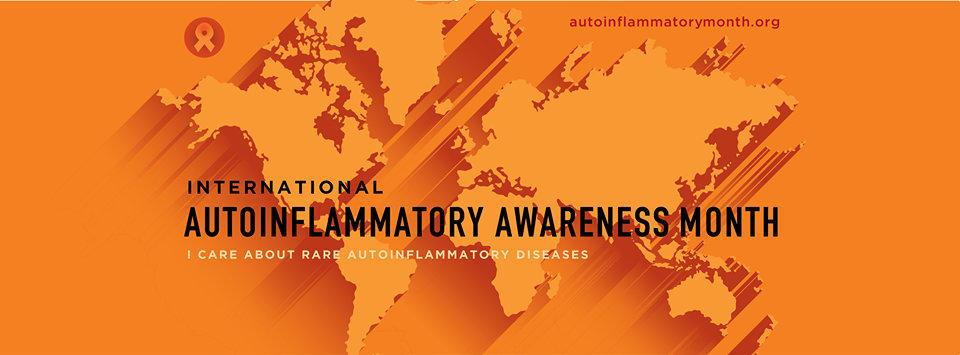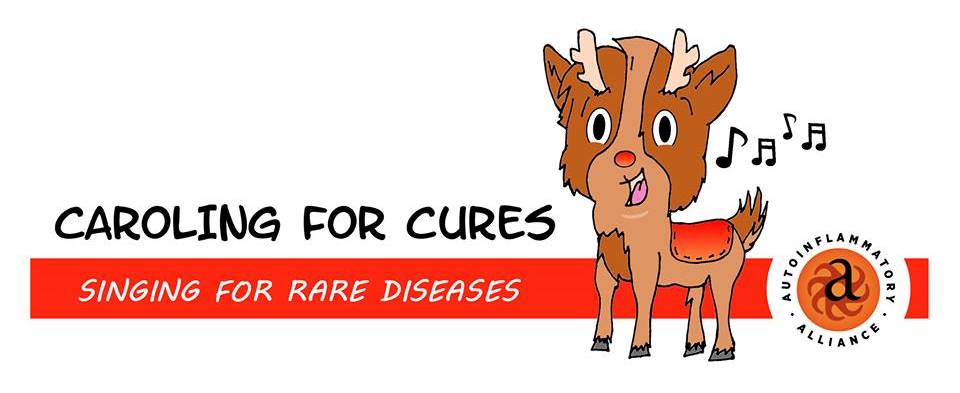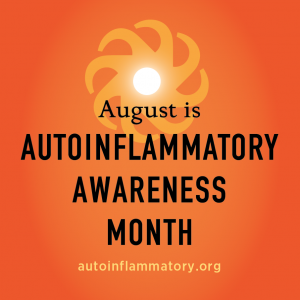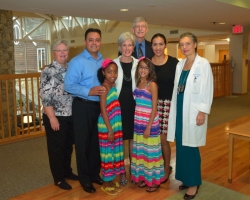
Aerial view of the NIH clinical research center. By NIH [Public domain], via Wikimedia Commons
The National Institutes of Health (NIH) funds and conducts research that has advanced all areas of health, from common diseases such as cancer and heart disease, to rare diseases such as autoinflammatory syndromes (aka, periodic fever syndromes). Experts at the NIH have been researching, and providing care to patients with, autoinflammatory diseases for over 25 years. Through the NIH, thousands of patients with mysterious symptoms, such as recurrent fevers, rashes, hearing loss, and joint swelling have gotten a diagnosis, treatment, and even had their lives saved by the experts there. Meet some of those patients below.
Learn more about how to advocate for more NIH funding and why it matters here.

Isaac celebrated his 10th birthday in style. Thanks to the NIH we will get to celebrate many more birthdays with Isaac.
Kathe Barchus: The NIH saved my son’s life.
My son Isaac has had a long journey with his illness, suffering in many ways from muscle pain to high fevers and so much in between.
It all started shortly after he was born and we saw a great many specialists, exhausting our local medical care. As parents, we were watching our child suffer and slip a bit farther away every day; it was a time of helplessness and desperation.
We began researching for any answers and found the NIH website. After some discussion, we applied online to a clinical trial, sending along a detailed history and pictures. Within several months, we made our first trip to the NIH to seek out new hope.
It was several years before we would have a diagnosis, but the team at the NIH never gave up. Our medical team gave us the hope we so greatly needed.
Isaac has been traveling to the NIH for 11 years now and he has CANDLE Syndrome (chronic atypical neutrophilic dermatosis with lipodystrophy and elevated temperature syndrome), an autosomal recessive genetic disease that is extremely rare. Isaac was failing on our first trip and our doctors turned him around, allowed him to grow and thrive.
In those 11 years, Isaac has had several drug trials, met with many different types of specialists, had genome sequencing, and is the only child known with his specific mutation that gives him this auto-inflammatory disease. CANDLE Syndrome affects all of Isaac’s tissues and causes him pain, rashes, fevers, loss of fat, short stature, insulin resistance, hypertension, low bone density, and so much more.
Without research and the NIH we know he would have succumbed to this disease, but today he is on a drug that is targeting the pathway that causes many of his symptoms. This drug has given him a greatly improved quality of life and he is currently very successful in school and church, plays non-contact sports, and has a circle of family and friends that adore and admire him.
He has endured a great deal during this journey and is a pioneer for his disease, allowing for improved care for others like him and also for research that has improved care in other patients with many other diseases.
In an interview for the Children’s Inn Isaac says,
My inspiration is all my friends around the world. I keep my body fighting, so they can see me.

As part of NIH research for autoinflammatory diseases, patients document symptoms with photos. Since they probably see a lot of concerning photos, I thought I would send a smiling photo and hopefully give them a smile.
Bob Riter: I’ve been a medical mystery for 40 years.
For nearly 40 years, I’ve experienced unusual, episodic, and unexplained rashes that mystified every physician I visited. It wasn’t even clear which medical specialty took care of conditions like mine.
I finally learned that I likely had an autoinflammatory disorder and was accepted into a clinical trial at NIH.
During my first visit, I had an incredible sense of emotional relief. They understood what I was talking about. Not only did they understand, they wanted to learn more. They were medical detectives and they were using the remarkable resources of NIH to help me. I couldn’t stop smiling during that visit.
I’m still uncategorized. That is, I have an autoinflammatory disorder of some sort, but testing is still underway to see if a genetic mutation can be found that explains it. This isn’t unusual. These conditions are so rare that it often takes time to find other patients with the same symptoms. Once that happens, our DNA can be compared and common mutations possibly identified.
Going to the NIH gave me both knowledge and hope. I knew that I was on the right path and that I finally had the right team behind me.
Click here to see more of Bob’s story.
How you can help these families and the thousands more who rely on the NIH for care, treatment, and research:
-Contact your elected officials about these issues. Read more, and follow the tips on how to advocate here.
-Share your NIH story with us! We would love to add more stories to this post, and on our blog! Contact us here if you’d like to share your story.
–Donate here to the Autoinflammatory Alliance to help support advocacy, research, and advancements for patients with autoinflammatory diseases.
To read more stories of how NIH clinical research studies help patients:
Click here to Meet Alex – Before and After NIH Clinical Trial
Follow the NOMID Nomad’s journey here.
Read more about Isaac’s story here.








